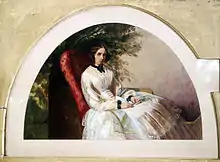
Clara Angela Macirone (20 January 1821 – 1914) was an English pianist and composer who published her music as C. A. Macirone. Born in London, she was the daughter of Italian musicians; her mother was also a pianist (a pupil of Charles Neate) and her father was an amateur tenor.[1] She began her studies at the Royal Academy of Music in 1879 under Cipriani Potter, W H Holmes, Charles Lucas and others. She later took a position teaching at the Academy.[2]
Her first concert was given at the Hanover Square Rooms on 26 June 1846, at which the baritone Johann Pischek performed her sacred song Benedictus, a composition later praised by Mendelssohn. She was active as a performer until 1864. After that, Macirone turned to teaching and composing. Her Te Deum and Jubilate were sung at Hanover Chapel and claimed to have been the first service by a woman ever used in the Church.[2]
Macirone was a pioneer in the musical education of women as both a teacher and writer. She held teaching positions at Aske's School for Girls in Hatcham (1872-8) and at the Church of England High School for Girls, Baker Street. She contributed articles to The Girl's Own Paper[3] and The Argosy. Macirone died in London in 1914.[4][5]
Works
Selected works include:
- Suite for piano and violin in E minor
- Rondino in G for piano
- By the Waters of Babylon, anthem (sung at Canterbury, Ely and elsewhere)
- Te Deum and Jubilate
- Benedictus[6]
- Footsteps of Angels, choral
- Come to Me, Oh Ye Children (Text: Henry Wadsworth Longfellow)
- Fare thee well! and if for ever (Text: George Gordon Noel Byron, Lord Byron)
- Hesperus (Text: Edwin Arnold after Sappho)
- The Balaclava Charge (Text: Alfred, Lord Tennyson)
- There is dew for the flow'ret (Text: Thomas Hood)[7]
References
- ↑ Neate, Patricia. All My Darlings - A Victorian Family in Their Own Words, Troubador 2018
- 1 2 Brown, James Duff; Stratton, Stephen Samuel. British musical biography: a dictionary of musical artists, authors and composers, born in Britain and its colonies (1897) - but note the competing claim for anthems by Alice Mary Smith first performed in February 1864.
- ↑ Victorian Voices music archive: The Girl's Own Paper (1882-1902)
- ↑ Sadie, Julie Anne; Samuel, Rhian (1994). The Norton/Grove dictionary of women composers. W. W. Norton & Company. ISBN 9780393034875. Retrieved 4 October 2010.
- ↑ Hughes, Rupert (1919). Music lovers' encyclopedia: containing a pronouncing and defining.
- ↑ Elson, Louis Charles (1912). University musical encyclopedia: Volume 9. [New York] The University society.
- ↑ "Clara Angela Macirone (1821-1915?)". Retrieved 9 January 2011.
External links